#waiting at the airport to go to my erasmus destination!!!
Explore tagged Tumblr posts
Text
.
#waiting at the airport to go to my erasmus destination!!!#aaaaaaahhhhhhhhhhh#so excited and so nervous
8 notes
·
View notes
Text
Geneva, the French and the Međimurci
After months of residing in the darkness of inactivity here comes a fresh review of the recent trip to Switzerland. Those 3 days were without expectations and with plenty of spontaneous decisions that turned out...awesome. I even managed get my Master thesis done and sent to print hours before the trip thus not having to bring my laptop there and work at the airport. I would also use this chance to thank again our hosts for the wonderful time we spent there as well as for helping us with the stay in Geneve. Merci beaucoup...or whatever you write it. Now what was all this about, when, why and how...please start scrolling. The whole trip was planned a few months ago as one our best and closest Uni colleagues was going to get married. Since we were sitting next to each other since the day 1 of the University life (and were breaking the Erasmus Intership Exchange ice together writing the letters and creating our portfolios in the bars between the Uni lectures...) there was no way for me not to come there. Wait a bit more to see the wedding pics. The interesting story is that she had met her future husband during Erasmus internship in Paris while I was in Vienna (maybe I should apply again for the exchange?). One of the last things in life I imagined was ending up on a wedding in Switzerland and be surrounded with the French and the Međimurci. On the trip there and back again I was with a few colleagues whom we will refer to as “the Noone”. Let’s start with...
DAY 1: Travelling from Zagreb to Venice Marco Polo Airport. Getting lost in Venice. Evening arrival to Geneve
Just before our trip there were several problems that were kept in secret in order not to spread panic. Our return flight with EasyJet was cancelled due to French Airline’s strike and luckily I was online to check us in on the next one an hour later. Had we not had the second flight the same evening things would gotten nasty with the bus schedule and arriving home on Monday morning to hand in our binded Master’s thesises.
The second crisis emerged early in the morning around 3am when I realized:
a) I left the sunglasses at my barber’s desk the day earlier
b) I forgot the headphones on my desk!!
We travelled with Flixbus, direct line from Zagreb to Marco Polo Airport, at 7.30am and arrived a bit later than scheduled due to traffic problems on the Italian highway and a traffic mess at the bus station in Trieste (sorry Italians, it was another prejudice come true...).
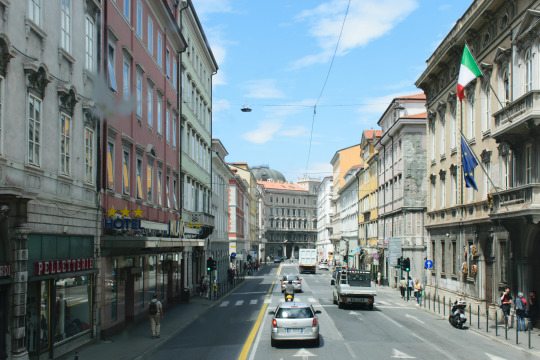
We came to our destination around 2.30pm and had almost 5 hours free before the flight. And what should we do?

Go to Venice of course! For the price of 15 Euros you get the bus return ticket from the airport to Venice. My colleague was there for the first time and for me it was the 3rd. I honestly didn’t expect going there but ... was worth it. The plan was to drink coffee somewhere but we didn’t have time as...umm... I wanted to make a tour around and we got lost on our way back...just a bit. : -) In the end we managed to get in time back.
The overall impression of Venice?
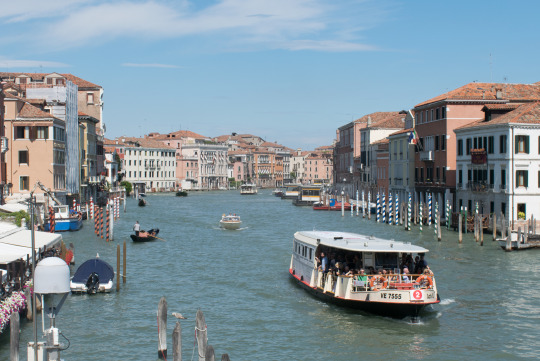
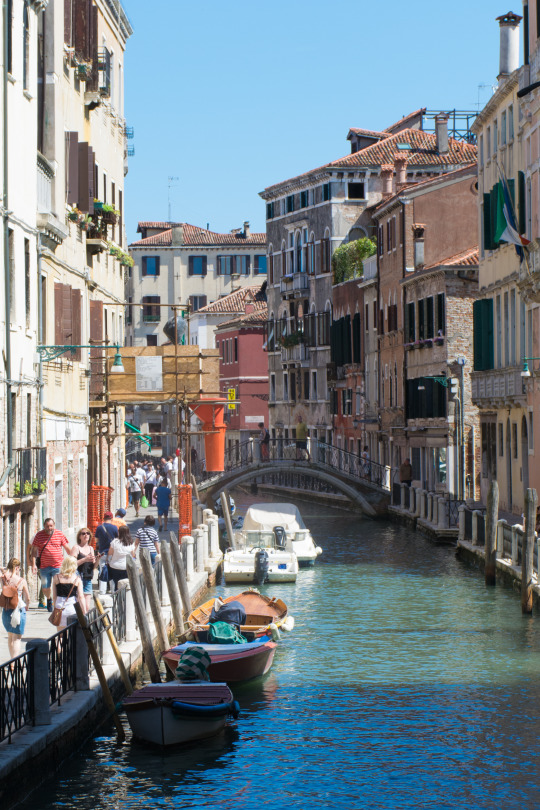
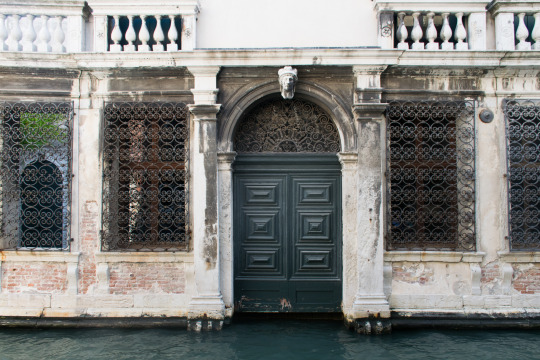
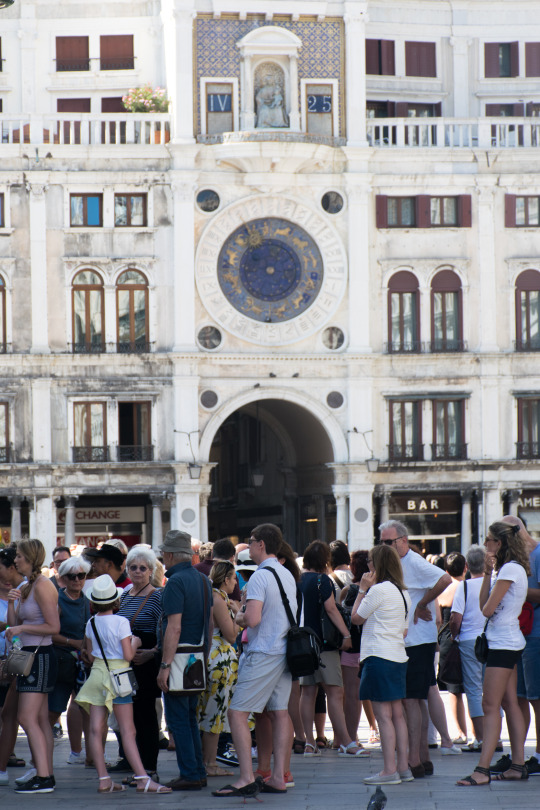
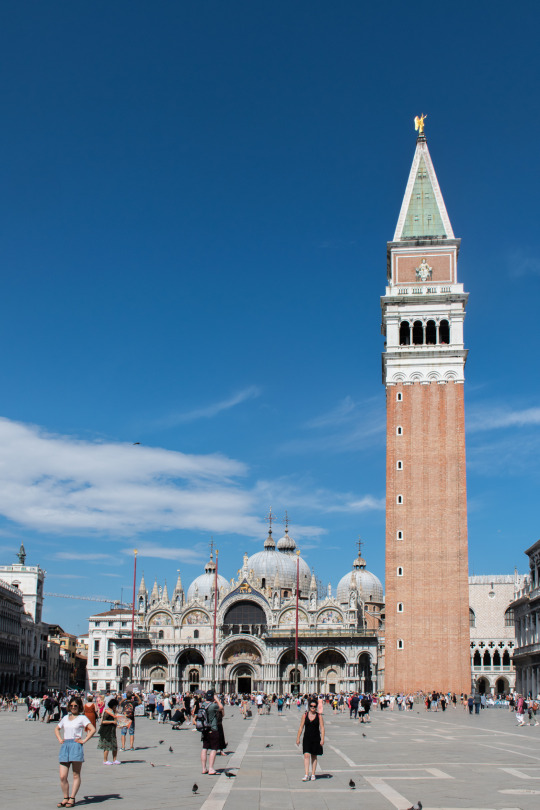
Crowded, hot, stinky...few buildings and streets that impress you in the beginning and then you get bored and start counting nationalities and bricks in the walls. As well as the shades to hide in.��
Just before the security check in I realized that I totally messed up with clothes and items in the travel bag...bringing unecessary stuff that took plenty of space. Never again listen to the others and just keep it simple. So I was forced to put my pants, part of ceremonial clothes etc. into the bags of my colleagues. :-D Just like Voldemort with the horcruxes.
Speaking of food and water supplies on your trips and specifically at the airports...there are two kinds of people in this world. Those who buy the bottled water in duty free shops... and those who drink and fill them in the restrooms (toilets). During my 3 days I only drank water from the restroom. Save money, save the nature.
Our flight was around 8pm and I spent most of it (one hour) sleeping dead tired. For those of you who’ve been following me from before you might remember I’ve already been to Switzerland but never in Geneve. (scroll down the blog for those posts).
Geneva airport? While going towards the exit you pass by numerous billboards of the Swiss watches...Rolex, Rolex, Rolex...and Rolex..and so on for the next 5 minutes. The good thing is that all the arriving guests have 80 minutes free public transport ticket so we went to the next stop (Geneve Cornavin). Our hostel (Geneve Hostel) was about 5-7 minutes by foot and close to the Geneva lake. Boys in one room, girls in another to avoid the potential problems. And unplanned weddings.
At the hostel we were also given free public transport ticket that was valid for the whole Saturday and Sunday which helped a lot. It included the train, the boats, the buses and the tram within Geneve. Since France was super close (cca 4 km) there was even a tram line leading there (about 30 minutes)...we heard you can have a cheaper lunch there and planned “to visit France” on Sunday but plans changed.
Before the sleep we searched around the hostel area for some cheap place to grab some food. Now, the word “cheap” in Switzerland is not as same as “cheap” here and the best for your psychological health is not to convert the currency. We found the Ali Kebab place right next to the hostel and ate Chicken Kebab with some salad and French fries for 17,5 Franks, a meal we split for two. This was relatively similar to some prices here so it was not that bad at all. I could have eaten though the whole plate again but my wallet couldn’t. No complaints anyway!
DAY 2: Morning tour around Geneve. Going to the ceremony. The wedding and the afterparty.
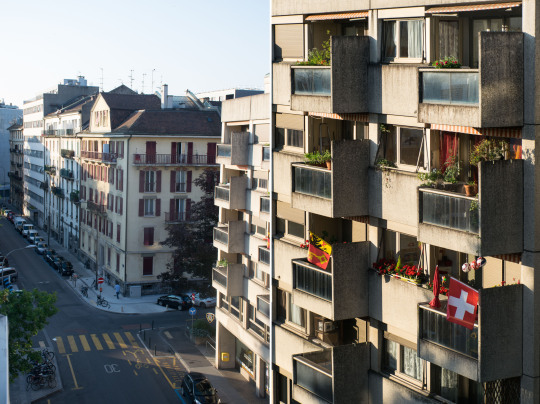

I’m a morning person and Saturday morning was no exception. Woke up early, took a shower, breakfast when there aren’t many people and already ready to go at 7.30am. I got the public transport and city landmarks map at the hostel staff and went to the lake with another early bird. Here are some impressions of the streets, people and cityscape.
Plenty of runners with bluetooth headphones, people walking with dogs, the cylists, expensive cars you see in James Bond movies, the specific architecture, plenty of hotels and banks, mostly clean sterile streets, the promenade and the boats. Pretty much international population and French language everywhere. And I don’t speak French except for few words but was interesting to be in an “alien” surroundings. The lake that is as huge as the sea yet fresh water. Ducks everywhere. What I loved was seeing the bike roads across the promenade and the streets of Geneve. More about it on Day 3. Speaking of traffic behaviour they all more or less stop when you approach the pedestrian zebra crossing and stop even 0,5 m before it if the red light turns on. On contrary, here you’d get run over even if you were sitting on your balcony.
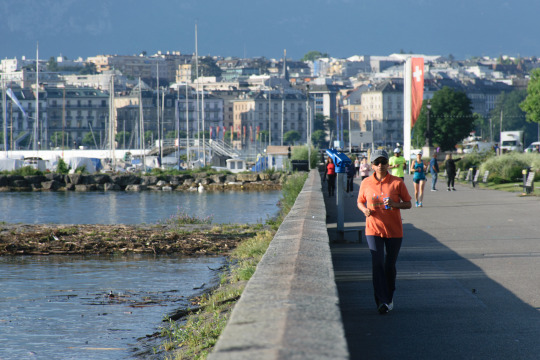


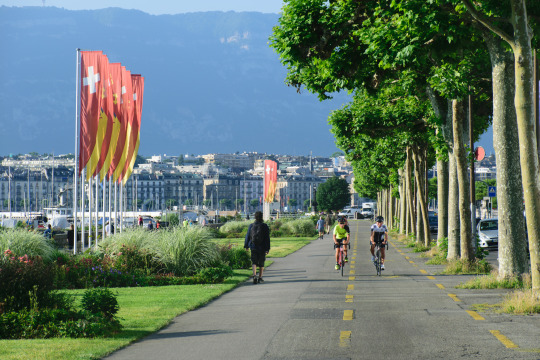


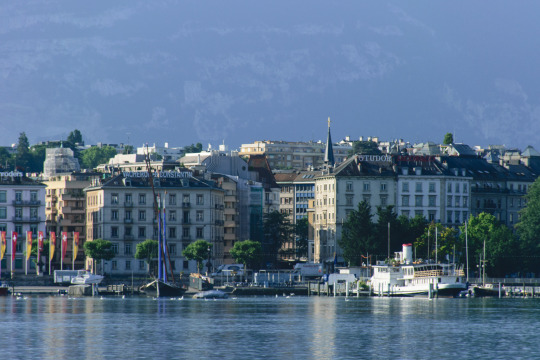
We went back to pick up the third early bird and started our little tour around. There were several bridges in the center and you had a boat connection with other side of the lake. There is the huge wheel with cafes around the big bridge. One of the Geneve’s landmarks is the huge fountain which we reached later and had a free shower. One of the things that pleasantly surprised me was (as I had found out later) the artistic project “Happy City” where there were ca. 20 painted pianos placed around the city’s squares, parks, streets and bridges...where you do as it says “Play, I’m here for you”. So I did what they required you to do. Playing piano on Lake Geneva was another thing I never thought about ... but now I can say “new achievement unlocked”.
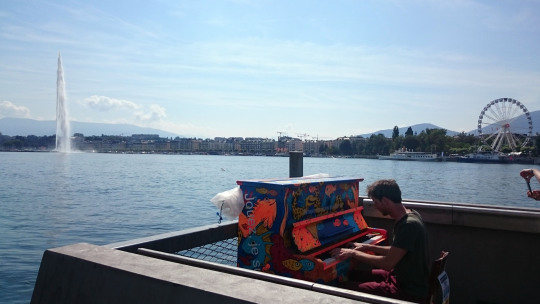

We walked a bit more to the inside of the other side up and down the streets, seen some churches and lots of interenational bars and restaurants. Expensive exotic cars again..and then decided it’s time to go back to hostel.

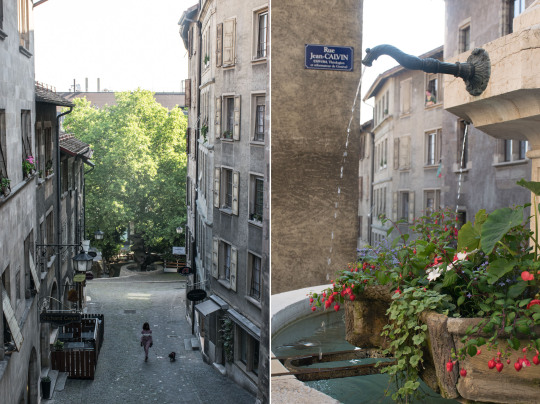


On our way back we checked out Lidl and took some emergency food to have just in case of unexpected hunger. This saved us on the next day. I also almost forgot that right now I can buy and drink Rivella.
Travelling to Gland and the Wedding.
We jumped into our suits and wedding clothes and went to the train station around 2pm. We had to arrive to Gland which is ca 20 minutes away from Geneve and there our fiancée’s family was going to pick us up and transport to the ceremony’s place. While there we got to know our French roommates and colleagues offiancé.
What I liked (and probably others) there weren’t many people as it usually is the case here. I won’t go into details here and throw emotions but here are some things. Close friends and family from both sides, that’s it. The ceremony took place at the fairy location called Le Moulin du Creux. Beautiful house with garden, creek and forest around located 100 meters from the road. Check the nice photos of it and you’ll get the idea.
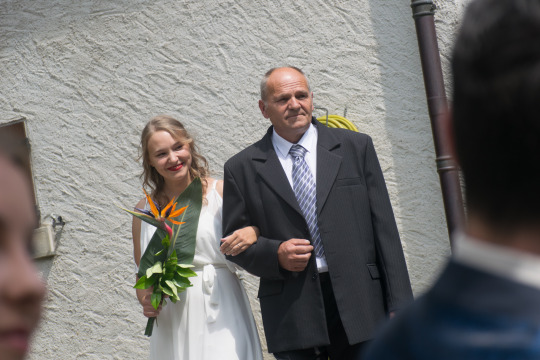
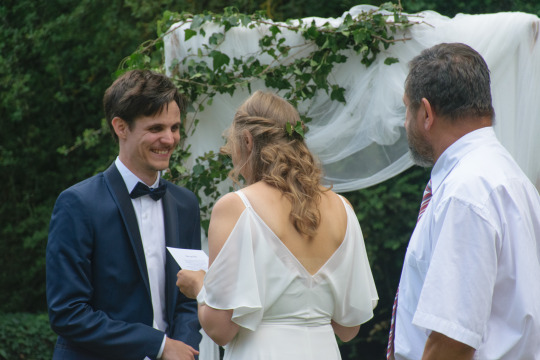
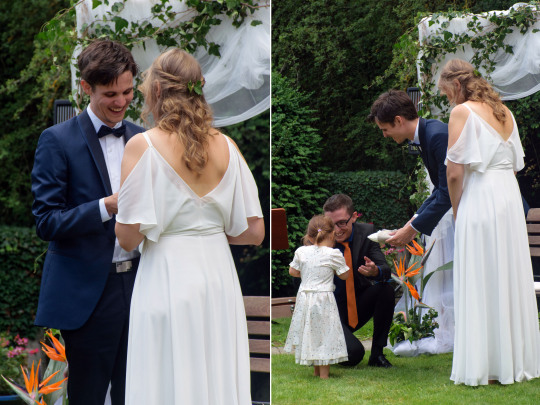


We had two-three pastors, the French ones and the Croatian one. Since most of us didn’t speak nor understood French we had a translator. And it was funny because she was a Slovene translating into Serbian mostly. :)) Nevertheless, an interesting ceremony and a special moment for our now married couple!
What was also new was that after taking pictures and rushing to the tables with food and drinks we also had a game organized - seek and answer game. They hid around 30 photos around the area and we got the papers with questions in French and Croatian. For my team it was kind of a fail in the end. We were trying to learn a few useful French phrases such as J'ai soif which means “I’m thirsty” when sneaking around the table with served drinks.
The other games included a catapult and a cubic football. There was also a gigantic version of the Jenga Tower which was fun to play. We took and received as a memory the polaroid photo with our couple and later moved inside for the dinner and the rest of the show. We watched short movie clips that fiance’s family created about him and our friend. The only problem we had was that we didn’t understand anything as there were no subtitles. :-)
After few more games and meals it was time to go out on the field and light the lanterns. This was a cool thing and my first time to show up and do the thing actually, I think we all enjoyed it. I have no photos of it though but you can imagined what it looked liked having many of them flying up. Let’s hope non of them fell on the forest below. :-D
Soon followed afterparty with some dance music. Some people already had to part and leave. Finally, around 2am we also decided to leave as we didn’t want to miss our train back to Geneve. And of course we missed the first one by being 5 minutes late.
We came to the hostel around 4am and straight to bed.
DAY 3: Tour around Geneve one more time. Coffee & city bikes. Departure.
The final day is here. So far everything great! We made a deal to meet with friends from Nyon around 10.30h at the giant wheel in the center. Shower, breakfast and baggage packed and locked in the hostel. Ready to go.
We took the boat to the other side and soon met with our friends. We then wasted around an hour going to the “old center” only to find nothing interesting there. However, we saw more of the public pianos and parks. For the next half an hour we were on a quest to find a solid cafe to sit and talk about life.

We ended up below the giant wheel and had a tiny cup of coffee for 4 Franks. Naturally, we stayed for 2 hours sitting & chatting there to compensate the loss. I ran out of cash and asked the waiter where to go. After all, Geneva is the city of banks and I hadn’t seen a single ATM machine there. Before running for some cash we decided to visit the giant fountain. On our way there I stopped by the public piano which was now free of ambitious moms and their kids who just pressed random keys but had a cool photo. Actually, I was doing the same. It was funny to have the unusual audience around you.
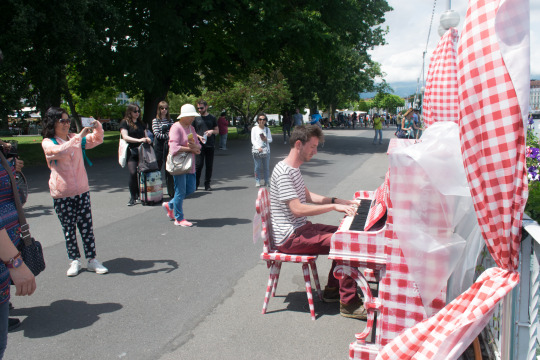
Soon by the fountain. Time for a group photo!

Time flew by quickly and our friends had to find the bus station as they were leaving sooner than us. We went to the center in search of places to eat and after parting with them three of the original squad left. We had a few hours left before rushing to the train station and the airport. Having lunch in France? Visiting France by trams? Visiting France on bikes? Using city bikes to go around? We rushed to the nearst bike station and...all the bikes were gone. Second chance at the one across the bridge. We somehow were lazy to walk and wasted time on the boat. What happened there? Only two bikes left. I agreed to run to the other station as the rest follows me. But the guy working there couldn’t find the keys of the bike so we waster 10 minutes there filling the papers and waiting for him to come to common sense. The third and the last luck before giving up was using the tram to the Station No. 5 ... and...three bikes left, keys in the hands and off we go!
There is no better feeling than going around the new place by bike. Pure freedom and flexbility. We gave 20 Franks deposit and decided towards the north along the lake. Bike routes almost everywhere. Going between the streets was fun. No fear of the vehicles around us.
youtube

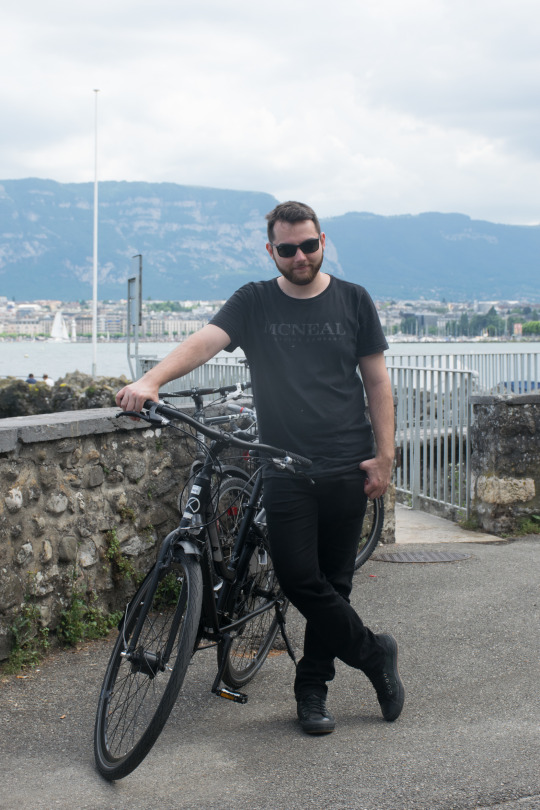
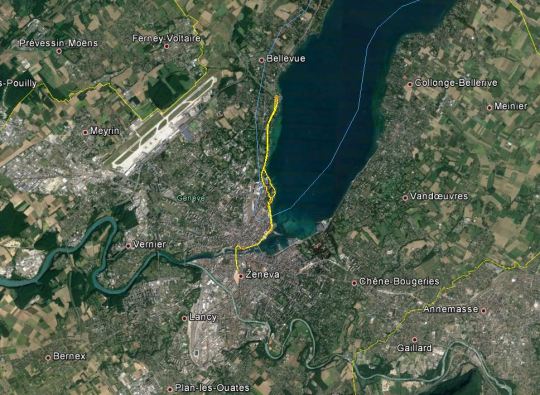
We did cca 10 km in total in about more than hour stopping to take the pictues (the evidences). The idea was to go to France but by democracy 2:1 we gave up from that idea fearing something could go wrong and we get stuck in the middle of nowhere and miss the plane. So we returned the bikes close to our hostel, took the baggage and went to the train station. There we found a nice souvenir and chocolate shop....you can’t leave without one kitschy fridge magnet and a few Toblerones. We met the other Croats who were going back by plane to Venice and I again reorganized my bagge stuff into 2-3 bags of other people. The food from Lidl helped a bit. As well as the good old fresh water from the restroom. I slept again in the plane this time successfully hiding my cabin baggage under my seat as the plane was crowded and full of passangers because of the cancelled flight. New achievement unlocked. We had almost 3 hours to wait for the 2.15am Flixbus for Zagreb. Being dead hungry we checked the available offers at the backery there and found some snacks to survive till home. This time Flixbus didn’t have the second floor (on Friday we found the first row spots on the 2nd floor, the best view and the best way to get killed in an accident). But who cares, soon home! The route was shorter as we stopped only in Ljubljana...I woke up two times in total and the second on just at the Croatian border. The bus arrived precisely at 7.30am to Zagreb, to the most beautiful of the ugliest bus stations in the area. Finally, seeing “Mamiću cigane” grafitti around the station I can say “Welcome back home!”.
5 notes
·
View notes
Text
Budget Travel Tips for Students Traveling in 2019
A trip abroad, whether it is to study in a different university for semester or to take a break from classes to seek a different kind of knowledge, is often (always?) a turning point in a student’s life.
But to make the most of their trip in 2019, students would do well to keep in mind those budget travel tips.
After all, there’s nothing more frustating than being in a new and exciting environment and be unable to fully enjoy it because you struggle financially.
These proven techniques have allowed me to travel to Europe and Asia as a student, without having to worry too much about money… despite a student loan.
Don’t approach your trip abroad as you do every exam, by starting to work on it at the last minute. The more prepared you are, the more you’ll enjoy the experience.
Before Leaving on Your Trip
Choose Your Destination Wisely
Where will you stay?
The place where you will spend a semester or more obviously has a major impact on how fast you will run out of money.
European countries are very varied in terms of cost of life. Western Europe and Scandinavia are generally more expensive than Central and Western Europe, as you can see on the maps from this handy post.
Now, keep in mind that while this means that you will feel more pressure on your budget in Western Europe and Scandinavia, it is actually very close to the cost of life in the US. Not to mention that if you decide to work on the side, you will earn more money than you would in Central and Eastern Europe.
But the latter has a lot to offer as well: not only will you find good universities in the East, it’s also very cheap and easy to travel to another country. Something to keep in mind if you consider visiting several countries during your stay in Europe.
The cost of life will generally be lower in South America, Africa, and Asia, with a few exceptions.
Save Money on Flights
Unlike for shorter trips, the price of your flight ticket isn’t going to be one of your main expenses when you travel for a few months… provided that you know how to book cheap flights.
When it comes to finding low fares, the key word is “flexibility”. Choose your travel dates and the time when you book your flight with care: the price can vary to more than double within a week.
As a rule of thumb, avoid flying during major holidays or on Fridays (when many people fly for a weekend trip) or Sundays (when people fly back from a weekend trip).
Use a flight search engine like Skyscanner or Momondo: they let you see the prices for a whole month at the same time, so you can easily spot which day is the cheapest one.
Keep in mind that to increase your chances of scoring the cheapest fares, you should aim at booking your international flight between 3-4 months in advance. Don’t rely on last-minute deals, it’s likely that there won’t be any.
If tickets to your destination are always expensive, consider an alternative path to your destination.
For example, when I went to China, tickets were very expensive for my dates (and I was very flexible with those). So instead of flying straight there, I flew to Vietnam, spent some time there, and then took a flight to China. The overall cost was much lower than if I had flown directly to China, even taking the accommodation costs in Vietnam into account.
For more ways to save money on flights, I highly recommend that you check out this post.
Look for Accommodation
Now that you know where you’re going, start thinking of where you’re going to stay… and how you can save money on accommodation.
Check out Student Dorms First
Being a student has major advantages when it comes to access to discounts (more on that later), especially in regards to accommodation. Mainly because your student status gives you access to student dorms.
If you’re traveling for a university exchange, contact your host university and inquire about the availability of dormitories on the campus or nearby. If there are any, this is probably your best bet to save money on accommodation.
Still, dig a little bit deeper first before booking a bed in a dorm.
Look for Shared Flats
In general, renting a room in a flat is more expensive than renting one in a dormitory. But if you can find roommates to split the expenses, the rent might be very similar in the end.
Just keep in mind that very often, you will have to leave a deposit first – even though you will (likely) recover it at the end of your stay, this is still a big expense at the beginning of the trip. Hence the need to find roommates if you elect this option.
If you’re traveling with other friends from university, ask them if they’d consider sharing a flat. If you’re alone, you can join Facebook groups for students traveling to your destination. In Europe, these groups will often be called “Erasmus [city name] [year]”.
You can also book your first month in the university dormitory and look for a shared flat once you’re there. Being on site usually makes things much easier.
Visit Your Doctor
No matter where you’re traveling, pay a visit to your doctor before your trip. Make sure that everything is in order health-wise and tell her/him about your travel plans: they will be able to advise whether you need any vaccines or should pack specific medication.
If you’re on a special treatment, make sure that you’ll be able to get what you need there, or ask your doctor for a prescription that will allow you to bring your medication with you. If your treatment isn’t available at your destination, it will cost you extra to have it brought to you from abroad.
A visit to your dentist probably isn’t a bad idea either… If it turns out that you have a problem abroad and your insurance doesn’t cover the fees, this could be a major unwanted expense that can easily ruin your trip.
Medical bills are usually very expensive, so you want to make sure that you’re as prepared as possible on that front, to limit the risks of bad surprises.
Get Your Travel Documents in Order
If you don’t already have one, get a passport. If you do have one, make sure it doesn’t expire while you’re abroad. Ideally, you want your passport’s expiration date to be at least 6 months after the date of your flight back: if for one reason or another you need to stay longer, you’ll be glad you have this 6-month margin rather than going to your embassy in emergency.
The same goes for your visa: check whether you need one or not in advance. If you wait until the last minute, you may have to request an accelerated procedure, which is always more expensive.
Once you’re abroad, you really do not want to have to make a hole in your budget because of administrative procedures. Make sure everything is sorted out before you hop on the plane.
Determine Your Bugdet and Ways to Manage It Efficiently
Estimate How Much this Trip Will Cost You
There is no need for you to go into too much details, but having a vague estimate of your expenses abroad will go a long way to helping you save money once you’re on site.
Do some research on the cost of life at your destination. You want to have a rough idea of how expensive are the rents, how much money you need for a month/week of grocery shopping, how costly it is to go out, etc.
Knowing this will help you manage your budget more efficiently once you’re there, as you will be able to compare your actual expenses with your initial research and make some adjustements to your spending habits if necessary.
Get an ISIC
As a student, the first thing you want to do is getting an International Student Identity Card (ISIC): this magic card will unlock a plethora of discounts for you. It is recognized in most countries around the world. Some countries, however, only recognize the local student cards – so once you’re abroad, try to get one of those done as well by your host university.
Apply for a Grant
You should also inquire about grants: if you’re not planning on working during your trip, these may be your sole source of revenue. The main institutions that could potentially offer a grant are your own university, your host univeristy, and the state. Do a bit of research and apply. Again, do so in advance, because grants are often given several months before
Contact your Bank
Make sure that using your credit or debit card abroad won’t incur significant fees. Tell your banker about your trip and the countries you’re planning on visiting: they’ll be able to recommend which card to use to save money on card payments and withdrawals. For example, it might be cheaper to withdraw large amounts of cash once you’re abroad, rather than pay by card, if there are fees every time that you do so.
If it looks like your bank doesn’t offer much advantages to people traveling abroad, consider changing. TransferWise‘s borderless account or the bank N26 have very low transfer fees and are particularly popular among young travelers.
If you think that your budget is a bit tight, you might want to raise the issue with your banker as well, to benefit from a loan a low rate. However, if you can avoid going into debt, refrain from taking a loan, as it will cost you more money in the long run.
Pack your Bag
Bring a (Small) Suitcase to Pack your Essentials… If you Really Have to
You may have noticed that I recommended that you pack your essentials. I meant exactly that. That’s why you should you insist on bringing a carry-on, bring only a small suitcase. Even if you’re leaving for 6 months or more.
To save money – or rather to avoid paying bag fees at the airport – make sure that your suitcase meets the airline’s requirements in terms of weight and dimension.
You might be tempted to bring all your favorite clothes, books, and other random items. Don’t. It’s a basic mistake. The lighter you travel, the more enjoyable the experience. It’s makes moving around much easier and pleasant, while a large and heavy suitcase will only make traveling a hassle.
So when you’re packing, apply the popular saying: “take half the clothes and twice the money” (yes, that last part can be tricky too, but at least, you have full control over the fiest one).
Wherever you will live, there will be a way for you to do a laundry. So apply the 1 to 6 rule.
But Consider Traveling with a Backpack Only
I know the idea might seem daunting, especially when leaving for several months at a time. But this is a key budget travel tip.
When going abroad, to study or not, you will travel to places other than the town or city where you will live. If you travel by plane, you need to have a small piece of luggage to use as a carry-on, that is both respectful of the airline’s dimensions requirements and in which you can pack enough for a few days.
Hence the backpack. You do NOT want to have a suitcase to carry when you’re on the move. Instead, opt for a anti-theft backpack that lets you keep your money safe and pack a few clothes, without hindering your mobility.
By traveling with a carry-on only, you will save a ton of money for your trip: most airlines’ basic fares include only a carry-on. If you want to get a hand on those cheap flights, you’d better opt for a backpack only.
Some people travel the world during years at a time with only a bag on their back. If they can do it for so long, surely you can do it for a few months.
During Your Trip
You’ve arrived at destination: now what? How do you make sure that you don’t run out of money?
A quick tip for you before getting to the heart of the matter: if you were flying from the US to Europe with a European airline and your flight was delayed, cancelled, or overbooked , and you reached your destination at least 3 hours later than planned, you may be entitled to $700 in compensation from the airline.
Manage Your Budget
You have two options to stay within your budget while traveling: you can either save money or earn some.
Or you can do both.
Find Ways to Save Money
Let’s start by cutting down your expenses.
Cancel your Unnecessary Subscriptions
What good is your gym membership if you can’t go to the gym for 6 months? Cancelling it before leaving will allow you to allocate this budget to a different activity when you’re abroad.
Review the list of all the services that you have subscribed to and cancel the superfluous ones. Be ruthless about it.
Save Money on Food
To save money on food, start by cooking your own meals as often as possible.
Buy your groceries at the local market or supermarket instead of have lunch and dinner at the restaurant every day. But do not look for the specific products that you are used to eating back home: they’re likely to cost much more than in the US. Instead, try the local, cheaper alternatives.
Save Money on Accomodation
If you’re like every other students who goes studying abroad, you’ll be traveling every time you get the chance (ie when you don’t have class).
A fantastic way to save money on accommodation while traveling is to volunteer. While you won’t be paid, you will generally be offered free board and lodging in exchange for your work. Most volunteers say that their experience was life-changing for them, so do take a minute to consider the idea.
You can find example of volunteer missions on websites like Workaway or HelpX. If you want to work on an organic farm, check out WWOOF. You can also work in a hostel, where you will meet travelers with inspiring stories and still have time to enjoy what the town or city has to offer.
Save Money while Visiting Places
Avoid booking expensive tours to discover a new city. Many places now offer free walking tours. They are generally organized and led by young locals anxious to show the beauty of their city in a casual atmosphere.
While the popular Lonely Planet and TripAdvisor can always give you an idea of what to do and see in a new city, you should also look for travel blogs on your destination, for more off-the-beaten-path inspiration. Why? Because these places are usally less touristic and therefore, cheaper than the rest, while also being more authentic.
Or Look Into Ways to Earn Money While Traveling
If you can’t refrain from spending more money than you should (or can afford), you’re going to need ways to earn more money while studying abroad.
Teach English… or Any Other Skill that you Have
Being an American student gives you a major advantage over many people around the world: you’re speaking English as a native language (or at least fluently).
Did you know that there are literally millions of people in the world willing to learn how to speak English? English teachers are in demand worldwide. But the best part is that you no longer need to give a class in person: you can now do it over a simple video call.
If teaching a language doesn’t appeal to you, you might be more inclined to share your passion. Do you play an instrument? I bet someone would love to learn! Do you do yoga? Or surf? People are looking for teachers in many places around the world.
Freelance
With your university degree in the pocket (or almost…), you probably already have business skills and knowledge that employers are looking for. By trying to sell them during your trip abroad, you will accomplish 2 things of value to you: you will earn money (that’s still your main goal) and you will add a work experience on your resume, which future potential employers will be delighted to see.
Based on your skills, you can do copywriting, design, programming, etc. Here as well, possibilities are endless, or close.
Build Your Plan to Integrate those Budget Travel Tips
There is no doubt that your trip abroad will be a life-changing experience. The extent to which it will may very well depend on how well you handle your budget.
Use this post as a checklist to prepare you trip and make sure that you don’t miss out on an opportunity to save money.
Happy travels!
Thomas Busson
Thomas is the SEO and Content Strategist at ClaimCompass. Frequent traveller, he loves sharing tips and news about the industry in a simple way.
from WordPress https://ift.tt/2qHROfo via IFTTT
0 notes
Photo

Gruß aus Bremen!
The time has finally come and I have arrived in Bremen! This has been a year in the making and it was quite an adventure getting here. It took a few days of packing, but I was very proud of myself for keeping my suitcase for a year under the 50 pound limit, being the notorious overpacker that I am! Wednesday afternoon on September 20th, I packed up the last of my things and said goodbye to the dog (admittedly I may have shed a tear or two saying bye to my best friend). Flying out of Newark was an experience in itself - having a driver take my stepmother and me to the airport, sitting in the security line for an hour, and quickly charging my electronics in an attempt to make them last for the next 36 hours. The second I stepped foot on the plane, nerves started building up as I began to think about what I was getting myself into by leaving the country for a year. We hopped across the pond just to land in Lisbon, Portugal for a 4 hour layover until we reached our next destination in Amsterdam. The plan was to take a train from Amsterdam to Bremen, but last minute my stepmother and I decided to rent a car to drive to Bremen instead, and oh boy, was that an experience. I have driven on the Autobahn before, but never in a small car where the odds of being overrun by someone going 120 km/hour are definitely greater. We learned quickly that you better get back in the right lane if you have no intentions of driving like you're on a NASCAR track. Four hours later, we arrived in Bremen ready to start my adventure!
The past couple of weeks have been amazing and I could not have asked for a better start to this year. Orientation here is something absolutely unheard of back in the U.S., considering that it is three weeks long in itself. The first day began with a welcome breakfast for all of us taking the Intensive Language course, where I met hoards of people from Italy (I'm very sure they're the biggest group of international students here), the Czech Republic, Turkey, and Spain, just to name a few. The Intensive Language Course has been a great way to start off my time here, as I got to practice my German for 3 hours a day with people from all over the world. It was nice to know that even if we come from different places, German has been the common denominator in our experience here so far. Although a lot of the class was review from home, it gave me the opportunity to practice my speaking skills and review grammar concepts that I haven't used in a while, or really since back at the beginning of May.
Orientation has also given me the opportunity to experience German culture at its best. The first week included all kinds of activities, such as German bowling, a Stammtisch, and a "Uni-Challenge." Of course, because we're in Germany, everything has included drinking. I was completely thrown off guard on the first day when our ERASMUS tour guide suggested that we get a beer to walk around campus with. Despite that, I have met some of the most amazing people through these daily activities who are going to become lifelong friends. We all collectively have no idea what we're doing whenever we go somewhere, but we're all in it together! It has also been nice to have the chance to walk around the city and get to know where I will be living for the next year. Even on my own time, I have gone on walks throughout the city square and the medieval Schnoor neighborhood.
In the next few months that I will be here, I am excited to begin working on my Blocker project that will have a focus on memorializing versus remembering people, events, etc. I was inspired by the recent debate taking place back at home as to whether or not we should be keeping Confederate statues up or taking them down so as not to glorify the dark intentions of the Civil War era. I read an article after the protests in Charlottesville back in August that described what Charlottesville looked like from the perspective of an American in Berlin. One line in particular in the article stood out to me: "Yet Germany certainly has not forgotten anything: There's just a recognition that remembering and memorializing are two different things." I began to think about the fact that Germany really does a great job at recognizing some of its dark history, especially when it comes to the Holocaust, and makes a point to make people aware of it without glorifying the actions of the perpetrators. As a student of International Relations with a strong interest in human rights, I have a strong interest in exploring the different ways in which Germany and Europeans recognize the actions and events of the past. Hopefully this coming year will allow me to visit memorials, statues, and other landmarks that give an insight into the past and how it can be viewed and recognized today.
The past couple of weeks have had their ups and downs. I have met some incredible people and had an amazing time getting to know them. I've also had some tough experiences, especially with the death of our dog at home. Despite that, I am ready for the semester to start and cannot wait to see what this year will bring for me. Hopefully every experience from here on out will present great opportunities for me to further immerse myself in the local culture and explore different places for my project. See you all soon!
0 notes